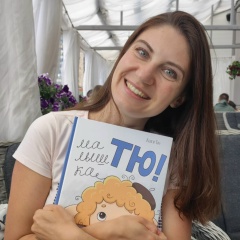6 июля, в библиотеке на 3й Советской, в рамках третьего ежегодного Дня Достоевского, прошел круглый стол на тему «Почему мы любим Достоевского?». Романы Фёдора Михайловича известны во всем мире, но в Японии, почему-то особенно. Там продолжают выходить новые переводы произведений Достоевского, снимаются неожиданные экранизации, а русские СМИ рассказывают нам, что все это массово читается и смотрится. Так ли это, мы попытались выяснить, пригласив на круглый стол молодых людей из Японии, изучающих русский язык в Санкт-Петербурге. Наше мероприятие оказалось интересно и госпоже Ацуми Ямасита, которая уже давно переехала в Россию и преподает японский язык. Жаль, что любимая Бара сэнсэй не смогла присоединиться, но очень хотела.
Мы были далеки от желания проводить научные изыскания, поэтому, построили наши диалоги на сопоставлении фрагментов из экранизаций "Идиота" режиссёров Пырьева И.А. и Акира Куросава. Для своего удовольствия Достоевского чаще читают не студенты, а люди чуть постарше, что вполне понятно. Однако имя писателя было знакомо всем участникам беседы, и они были полны решимости прочитать и перечитать «Идиота» и «Братьев Карамазовых», о которых шла речь. Вместе мы смотрели и рассуждали, в чем различая, а в чем сходства изображения героев и сцен, снятых русским и японским режиссерами. Что касается реплик героев и общей канвы, то оба режиссера, придерживались текста русского классика, но герои и их осмысление несколько разные. Три часа продолжался диалог двух культур, но далеко не все было сказано. Языковой барьер, конечно, имеет место быть. Ребятам, изучающим русский, было очень тяжело, а изучающие и изучавшие японский не решались браться за перевод великого и "ужасного" Достоевского. К тому же оказалось, что герои Акира Куросавы говорят на старом японском и их очень тяжело понимать.
http://vk.com/album-30426960_176691352
Мы были далеки от желания проводить научные изыскания, поэтому, построили наши диалоги на сопоставлении фрагментов из экранизаций "Идиота" режиссёров Пырьева И.А. и Акира Куросава. Для своего удовольствия Достоевского чаще читают не студенты, а люди чуть постарше, что вполне понятно. Однако имя писателя было знакомо всем участникам беседы, и они были полны решимости прочитать и перечитать «Идиота» и «Братьев Карамазовых», о которых шла речь. Вместе мы смотрели и рассуждали, в чем различая, а в чем сходства изображения героев и сцен, снятых русским и японским режиссерами. Что касается реплик героев и общей канвы, то оба режиссера, придерживались текста русского классика, но герои и их осмысление несколько разные. Три часа продолжался диалог двух культур, но далеко не все было сказано. Языковой барьер, конечно, имеет место быть. Ребятам, изучающим русский, было очень тяжело, а изучающие и изучавшие японский не решались браться за перевод великого и "ужасного" Достоевского. К тому же оказалось, что герои Акира Куросавы говорят на старом японском и их очень тяжело понимать.
http://vk.com/album-30426960_176691352
On July 6, in the library on 3rd Soviet, within the framework of the third annual Dostoevsky Day, a round table was held on the topic "Why do we love Dostoevsky?" Fyodor Mikhailovich's novels are known all over the world, but in Japan, for some reason, especially. New translations of Dostoevsky's works continue to be published there, unexpected film adaptations are being made, and the Russian media tell us that all this is read and looked en masse. Whether this is so, we tried to find out by inviting young people from Japan studying Russian in St. Petersburg to the round table. Our event was also interesting for Mrs. Atsumi Yamashita, who has long moved to Russia and teaches Japanese. It is a pity that beloved Bara Sensei could not join, but she really wanted to.
We were far from wanting to conduct scientific research, therefore, we built our dialogues on the comparison of fragments from the film adaptations of "The Idiot" directed by I.A. and Akira Kurosawa. For their own pleasure, Dostoevsky is more often read not by students, but by slightly older people, which is quite understandable. However, the name of the writer was familiar to all the participants in the conversation, and they were determined to read and reread The Idiot and The Brothers Karamazov, which were discussed. Together we watched and discussed what is the difference, and what is the similarity between the images of heroes and scenes shot by Russian and Japanese directors. As for the replicas of the heroes and the general outline, both directors adhered to the text of the Russian classic, but the heroes and their interpretation are somewhat different. The dialogue between the two cultures lasted for three hours, but far from everything was said. The language barrier, of course, does exist. It was very difficult for the children studying Russian, and those who studied and studied Japanese did not dare to undertake the translation of the great and "terrible" Dostoevsky. In addition, it turned out that Akira Kurosawa's characters speak Old Japanese and are very difficult to understand.
http://vk.com/album-30426960_176691352
We were far from wanting to conduct scientific research, therefore, we built our dialogues on the comparison of fragments from the film adaptations of "The Idiot" directed by I.A. and Akira Kurosawa. For their own pleasure, Dostoevsky is more often read not by students, but by slightly older people, which is quite understandable. However, the name of the writer was familiar to all the participants in the conversation, and they were determined to read and reread The Idiot and The Brothers Karamazov, which were discussed. Together we watched and discussed what is the difference, and what is the similarity between the images of heroes and scenes shot by Russian and Japanese directors. As for the replicas of the heroes and the general outline, both directors adhered to the text of the Russian classic, but the heroes and their interpretation are somewhat different. The dialogue between the two cultures lasted for three hours, but far from everything was said. The language barrier, of course, does exist. It was very difficult for the children studying Russian, and those who studied and studied Japanese did not dare to undertake the translation of the great and "terrible" Dostoevsky. In addition, it turned out that Akira Kurosawa's characters speak Old Japanese and are very difficult to understand.
http://vk.com/album-30426960_176691352
У записи 1 лайков,
1 репостов.
1 репостов.
Эту запись оставил(а) на своей стене Ира Батуева





















